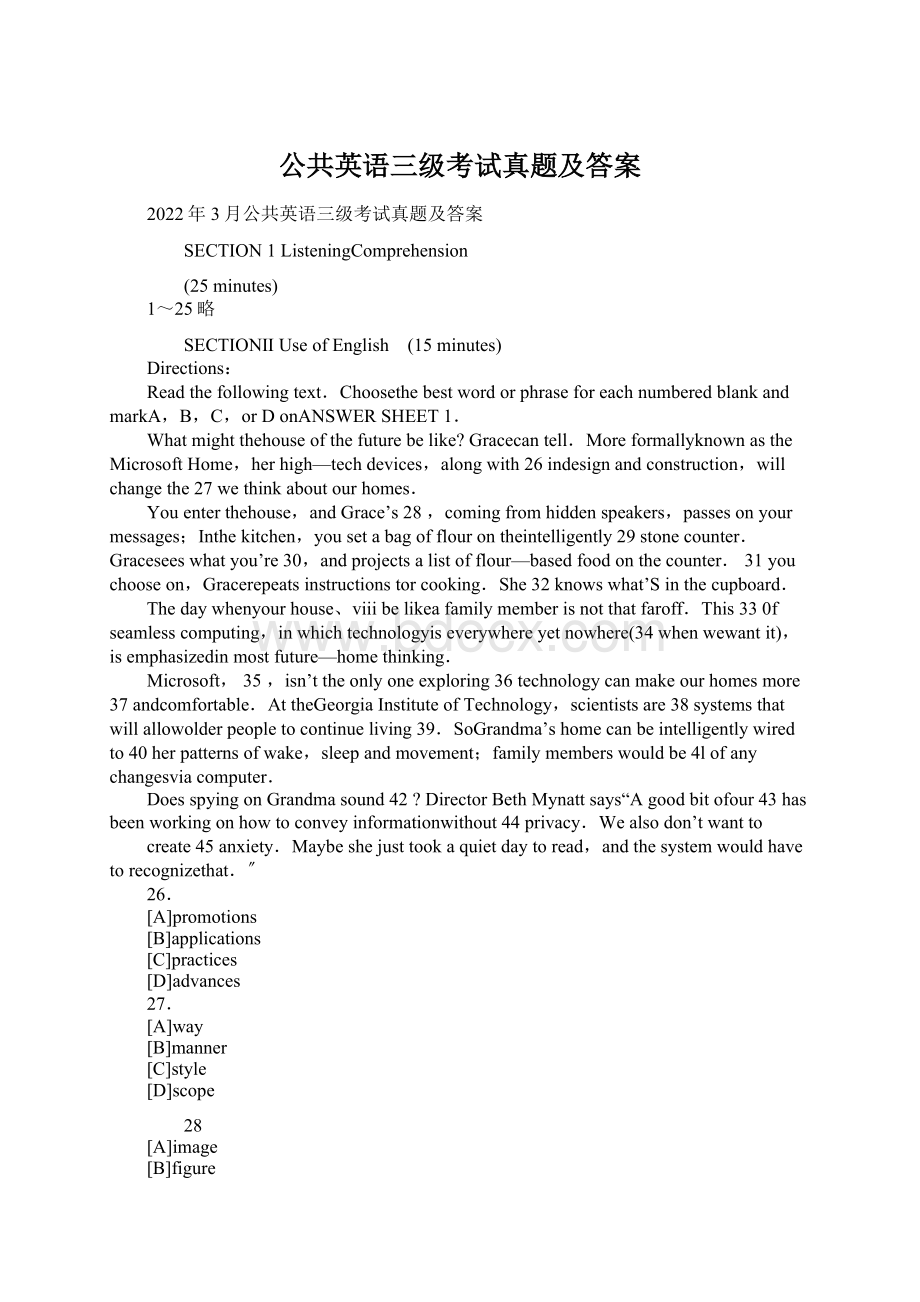公共英语三级考试真题及答案.docx
《公共英语三级考试真题及答案.docx》由会员分享,可在线阅读,更多相关《公共英语三级考试真题及答案.docx(15页珍藏版)》请在冰豆网上搜索。

公共英语三级考试真题及答案
2022年3月公共英语三级考试真题及答案
SECTION1ListeningComprehension
(25minutes)
1~25略
SECTIONⅡUseofEnglish (15minutes)
Directions:
Readthefollowingtext.ChoosethebestwordorphraseforeachnumberedblankandmarkA,B,C,orDonANSWERSHEET1.
Whatmightthehouseofthefuturebelike?
Gracecantell.MoreformallyknownastheMicrosoftHome,herhigh—techdevices,alongwith26indesignandconstruction,willchangethe27wethinkaboutourhomes.
Youenterthehouse,andGrace’s28,comingfromhiddenspeakers,passesonyourmessages;Inthekitchen,yousetabagofflourontheintelligently29stonecounter.Graceseeswhatyou’re30,andprojectsalistofflour—basedfoodonthecounter.31youchooseon,Gracerepeatsinstructionstorcooking.She32knowswhat’Sinthecupboard.
Thedaywhenyourhouse、viiibelikeafamilymemberisnotthatfaroff.This330fseamlesscomputing,inwhichtechnologyiseverywhereyetnowhere(34whenwewantit),isemphasizedinmostfuture—homethinking.
Microsoft,35,isn’ttheonlyoneexploring36technologycanmakeourhomesmore37andcomfortable.AttheGeorgiaInstituteofTechnology,scientistsare38systemsthatwillallowolderpeopletocontinueliving39.SoGrandma’shomecanbeintelligentlywiredto40herpatternsofwake,sleepandmovement;familymemberswouldbe4lofanychangesviacomputer.
DoesspyingonGrandmasound42?
DirectorBethMynattsays“Agoodbitofour43hasbeenworkingonhowtoconveyinformationwithout44privacy.Wealsodon’twantto
create45anxiety.Maybeshejusttookaquietdaytoread,andthesystemwouldhavetorecognizethat.〞
26.
[A]promotions
[B]applications
[C]practices
[D]advances
27.
[A]way
[B]manner
[C]style
[D]scope
28
[A]image
[B]figure
[C]voice
[D]sound
29.
[A]disposed
[B]shaped
[C]engineered
[D]conditioned
30.
[A]saying
[B]feeling
[C]searching
[D]doing
32
[A]Before
[B]Once
[C]Since
[D]Unless
32.
[A]even
[B]thus
[C]yet
[D]only
33
[A]hope
[B]passion
[C]faith
[D]notion
34.
[A]perhaps
[B]except
[C]provided
[D]especially
35.
[A]therefore
[B]likewise
[C]however
[D]moreover
36.
[A]how
[B]whether
[C]what
[D]why
37.
[A]fashionable
[B]complicated
[C]efficient
[D]attractive
38.
[A]decorating
[B]designing
[C]delivering
[D]debating
39.
[A]independently
[B]enthusiastically
[C]colorfully
[D]satisfactorily
40.
[A]receive
[B]recognize
[C]represent
[D]review
41.
[A]warned
[B]relieved
[C]advised
[D]informed
42.
[A]interesting
[B]boring
[C]disturbing
[D]appealing
43.
[A]analysis
[B]research
[C]concern
[D]focus
44.
[A]sacrificing
[B]affecting
[C]preventing
[D]losing
45.
[A]unusual
[B]unfortunate
[C]uncertain
[D]unnecessary
SECTIONⅢReadingComprehension(40minutes)
PartA
Directions:
Readthefollowingthreetexts.AnswerthequestionsoneachtextbychoosingA,B,C
orD.MarkyouranswersonANSWERSHEET1.
Text1
WheneverCatherineBrown,a37-year.oldjournalist,andherfriends,professionalsintheir30sandearly40s,meetataLondoncaf6,theirfavoritetopicofconversationisrelationships:
men’sreluctancetocommit,women’sindependence,andwhentohavechildren--or,increasingly,whethertohavethematall.“Withtheyearspassingmychancesofhavingachildgodown,butIWon’tmaltyanyonejusttohaveachild,〞saysBrown.TopeoplelikeBrown,babiesaregreat_ifthetimingisright.Butthey’recertainlynotessential.
Inmuchoftheworld,havingkidsisnolongeragiven.“Neverbeforehaschildlessnessbeen
anunderstandabledecisionforwomenandmeninsomanysocieties,〞saysFrankHakimattheLondonSchoolofEconomics.Youngpeopleareextendingtheirchild—freeadulthoodbypostponingchildrenuntiltheyarewellintotheir30s.oreven40sandbeyond.
Agrowingshareareendingupwithnochildrenatall.LifetimechildlessnessinwesternGer-manyhashit30percentamonguniversity—educatedwomen,andisrapidlyrisingamonglower—classmen.InBritain,thenumberofwomenremainingchildlesshasdoubledin20years.
Thelatesttrendofchildlessnessdoesnotfollowhistoricpatterns.ForcenturiesitwasnotunusualforaquarterofEuropeanwomentoremainchildless.Butinthepast.childlessnesswasusuallytheproductofpovertyordisaster.ofmissingmenintimesofwar.Todaythedecisiontohave—ornothave——achildistheresultofacomplexcombinationoffactors,includingrelationships,career
Opportunities,lifestyleandeconomics.
Insomecaseschildlessnessamongwomencanbeseenasaquietformofprotest.InJapan,supportforworkingmothershardlyexists.Childcareisexpensive,mendon’thelpout,andsomecompaniesstronglydiscouragemothersfromreturningtowork.“InJapan,it'scareerorchild,〞sayswriterKaoriHaishi.It’snotjustwomenwhoaredecidingagainstchildren;accordingtoare-centstudy,Japanesemenareevenlessinclinedtomarryorwantachild.Theirmotivations,though,mayhavemoretodowitheconomicfactors.
46.CatherineBrownandherfriendsfeelthathavingchildrenisnot__________.
[A]totallywise
[B]ahugeproblem
[C]arationalchoice
[D]absolutelynecessary
47.ItCanbeinferredthat,formanywomen,havingbabiesnowadaysis__________.
[A]ahardcommitment
[B]helpfultotheircareer
[C]essentialforhappiness
[D]anunderstandabledecision
48.Intheolddays。
manywomenremainedchildless__________
[A]asaquietformofprotest
[B]becauseoflackofsupport
[C]becauseofunfortunatecircumstances
[D]becausetheylackedsocialresponsibility
49.Welearnthatchildlessnessatpresent__________.
[A]affectsEuropemorethanitdoesAsia
[B]producesmorebenefitsthaninthepast
[C]ismoreawoman’sdecisionthanaman’s
[D]ismorecomplexinitscausethanthatinthepast
50.Accordingtothetext,whenaJapanesemandecidesnottohavechildren,heprobablyfeelsunableto__________.
[A]helpwithhousework
[B]affordtohaveachild
[C]bearesponsiblefather
[D]balanceworkandfamily
Text2
Facedwithamission.criticaldecision,whowouldyouturntoforadvice?
Someoneyouhadgreatconfidencein,surely.Butseverallinesofresearchshowthatourinstinctsaboutwheretommtoforcounselareoftennotcompletelycorrect.
Myresearchlooksatprejudicesthataffecthowpeopleuseadvice,includingwhytheyoftenblindlyfollowrecommendationsfrompeoplewho—asfarastheyknow—areasknowledgeableastheyare.InstudiesIconductedwithDonMooreofCarnegieMellonUniversity,forexample,Ifoundmatpeopletendtoovervalueadvicewhentheproblemthey’readdressingishardandtoundervalueitwhentheproblemiseasy.
Inourexperiments.subjectswereaskedtoguesstheweightofpeopleinvariouspictures,someofwhichwereinfocusandsomeofwhichwereunclear.Foreachpicture,subjectsguessedtwice:
thefirsttimewithoutadviceandthesecondtimewithinputfromanotherparticipant.Whenmepictureswereinfocus,wefound,subjectstendedtodiscounttheadvice;apparently,theywereconfidentintheirabilitytoguesscorrectly.Whenthepictureswereunclear,subjectsleanedheavily
onmeadviceofothersandseemedlesssecureabouttheirinitialopinion.Becausetheymisjudgedthevalue0ftheadvicetheyreceived--consistentlyovervaluingorundervaluingitdependingonthedifficultyoftheproblem—oursubjectsdidnotmakethebestguessesoverall.Theywouldhavedonebetterifthey’dconsideredtheadviceequally,andtoamoderatedegree,onbothhardandeasy
tasks.
Anotheradvice—relatedprejudiceI'vefoundcompelspeopletoovervalueadvicethattheypayfor.nonestudyIconducted,subjectsanswereddifferentsetsofquestionsaboutAmericanhistory.Beforeansweringsomeofthequestions.theycouldgetadviceonthecorrectanswerfromanothersubjectwhomtheyknewwasnomoreexpertthantheywere.Inoneversionoftheexperiment,peoplecouldgetadviceforfree,whileinanotherversion,theypaidforit.Whentheypaidforad’vice,peopletendedtohavefirmbeliefinit,Isuspect,byacombinationofsunk—costprejudiceandthenearlyinstinctualbeliefthatcostandqualityarelinked.
51.Inthefaceofamission—criticaldecision,peopletendto__________.
[A]trusttheirownefforts
[B]relyonresearchfindings
[C]getaffectedbyother’sopinion
[D]seekhelpfromthemoreknowledgable
52.Researchshowsthatwhenfacedwithdifficultproblemspeopleoften__________.
[A]discountothers’advice
[B]overlookothers’advice
[C]disagreewithothers‘advice
[D]over—relyonothers’advice
53.Thefirstexperimenttriestoprovehowobjectiveconditions__________.
[A]strengthenpeople’sinitialopinion
[B]strengthenpeople’sself-confidence
[C]influencepeople’sresponsetoadvice
[D]influencepeople’sguessofweightloss
54.Itcanbeinferredthatpeoplearelikelyto__________.
[A]undervaluefreeadvice
[B]overvaluepeer’sadvice
[C]misinterpretspecialist’sadvice
[D]misjudgetheirinstinctualbelief
55.Thetwoexperimentsmentionedinthetextreveal__________.
[A]howtofollowothers’advice
[B]howtounderstandothers’advice
[C]whatcausespeopletoseekadvice
[D]whataffectspeople’sattitudetoadvice
Text3
TopNationalHealthService(NHS)nurseswillbeabletoearn$40,000ayearwithoutleavingfrontlinepatientcareinamodificationtosalarystructures.New“supernurse〞gradeswillbecreatedtoenablethebeststafftoincreasetheirsalarieswithouthavingtomoveintomanagementdeskjobsCurrentlythemostseniorNHSnursescanearnamaximum$28,000ayearunlesst